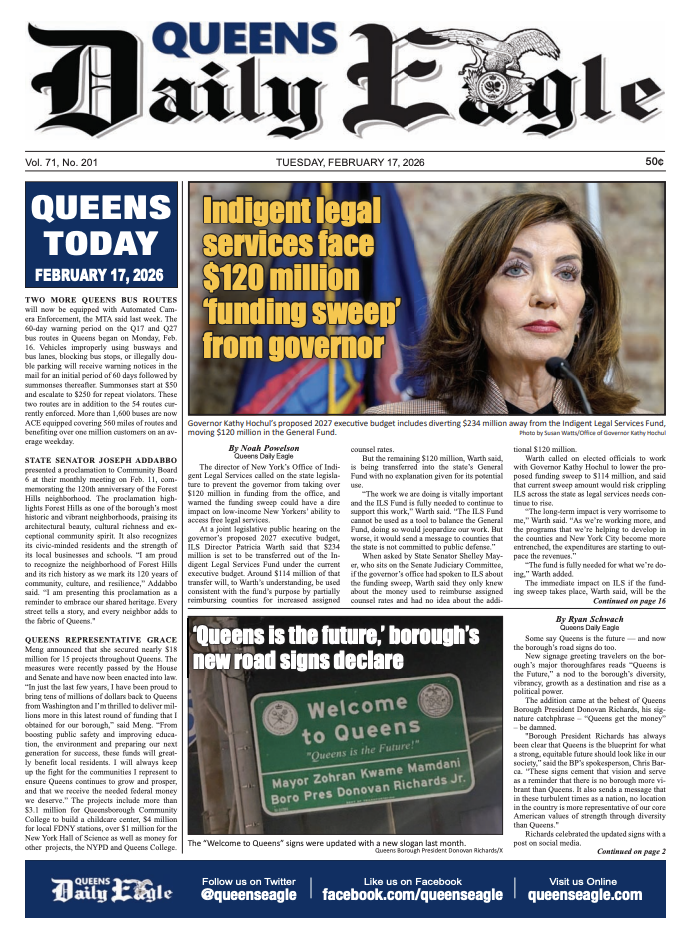First defendants arraigned under new Queens DA, state bail reform
/The Queens Criminal Courthouse. Eagle file photo by David Brand
By David Brand
Wednesday marked an historic day for the Queens criminal justice system, as District Attorney Melinda Katz, the first woman ever elected as the county’s top prosecutor, began her tenure. At the same time, major bail reforms took effect statewide.
Some changes were evident during the first arraignments of Katz’s tenure, but her campaign pledge to never seek cash bail — her campaign website says “ending cash bail completely” — had not yet taken hold in her first two days. Assistant district attorneys requested cash bail on at least two occasions while the Eagle was at arraignments on Wednesday and Thursday.
At the start of her campaign for the Democratic nomination for Queens DA, Katz pledged to never ask for cash bail on misdemeanors or nonviolent felonies. Some of Katz’s opponents in the race went even further, pledging to never ask for cash bail in any circumstances. Katz adopted the same position. “Under my administration, we will have no cash bail,” she said during a June 2019 debate on NY1.
Katz helms an immense operation with more than 600 employees that was directed for nearly three decades by the same cohort of executives. Late DA Richard Brown served from 1991 until his death in May 2018; top deputy John Ryan, who also served in the office since 1991, then took over as acting DA.
Katz has vowed major institutional changes — including a staff overhaul — as she implements several changes to the way justice is dispensed and defendants are treated in the borough of 2.3 million people. She outlined many of her proposed policies in position papers on the campaign trail and she immediately abandoned a controversial office policy that had prevented defendants from negotiating plea deals unless they waived their right to a grand jury.
“It’s a new day in Queens County for defendants,” Katz told Brian Lehrer during a Dec. 23 appearance on WNYC. The DA’s Office and Katz’s transition team did not respond to emails and phone calls seeking comment for this story.
The first defendant arraigned in 2020 was a man named Frank Bugeja, who was charged with first-degree robbery for allegedly stealing a cell phone from a complainant who said Bugeja threatened them with a sharp object. Assistant District Attorney Kiran Cheema, the prosecutor handling the case, said Bugeja had two prior felony convictions and she asked for $50,000 bail. The public defender representing Bugeja asked for him to be released without bail
Judge John Zoll set $2,000 cash bail, which Bugeja could not pay. Bugeja was remanded to Rikers Island and will return to court on Jan. 6.
Under the state’s brand new bail law, judges cannot set cash bail on misdemeanors, nonviolent felonies and certain robbery and burglary offenses considered violent felonies. First-degree robbery — which includes robbery where a defendant allegedly uses or threatens to use a “dangerous instrument — is considered a bail eligible violent felony.
Cheema did, however, reference Katz’s major reform, telling Zoll that Queens prosecutors “no longer engage in a plea policy post-indictment.”
The only other defendant arraigned before 11 a.m. Wednesday morning was a man living in a homeless shelter who missed a previous court date. He was arrested on a bench warrant and Zoll imposed supervised release to ensure he returns for his next scheduled appearance.
“If you do not come back to court, you will have bail set on you,” Zoll said.
The city will drastically expand supervised release programs to ensure defendants released without bail make their scheduled appearances — the purpose of bail.
The initiative, pioneered in Queens, relies on social workers and case managers who work with defendants and “offers a strong, proven solution to the challenges and opportunities provided by the State's bail reform measures,” said Elizabeth Glazer, director of the Mayor’s Office of Criminal Justice, which oversees the initiative.
Former top prosecutors in the Queens DA’s Office had opposed a reliance on supervised release programs because about 8 percent of defendants were re-arrested for felonies, according to city data, and 20 percent were arrested for misdemeanors while in the program, according to The New York Times.
“The more expansive the city becomes in taking people into the supervised release program, the more of these defendants are going to be committing crimes when they’re out,” Former Chief Executive Assistant DA James Quinn told the Times last year. “And that’s our concern.”
On Thursday morning, the ADA working in the arraignment part requested $10,000 bail for a man named Theodore Bryant who was charged with various misdemeanors and a criminal contempt felony related to an alleged domestic violence incident. The man had three prior felony convictions, all from the 1980s.
The judge set $5,000 bail citing Bryant’s past charges related to domestic violence and said he was a “flight risk.”




